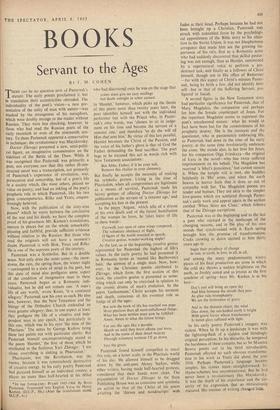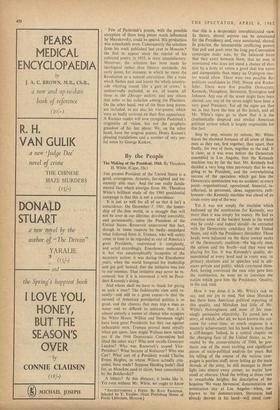BOOKS
Servant to the Ages
By J. M COHEN
THERE can be no question now of Pasternak's stature. The early poems proclaimed it, but in translation their eccentricities obtruded. The individuality of the poet's vision—a new pre- sentation of the unity of man with nature—was Masked by the ,strangeness of his metaphors, Which were doubly strange to the reader without Russian. They were less shocking, however, to those who had read the Russian poets of the early twentieth or even of the nineteenth cen- tury. To them Pasternak appeared a conservative in technique; the revolutionary was Mayakovsky.
Doctor Zhivago presented a new, semi-politi- cal figure, an imaginative commentator on the sidelines of the Battle of the Thaw. While it was recognised that Pasternak was primarily a poet, not everyone, saw that this rather ill-con- structed novel was a transcription, not primarily of Pasternak's experience of revolution, war, persecution and censorship, but of a poet's life in a society which, like most others, placed no value on poetry, and had no inkling of the poet's prophetic role in which Pasternak, like his two great contemporaries, Rilke and Yeats, unques- tioningly believed.
Now, with the publication of the sixty-nine poems* which he wrote between the conclusion of the war and his death, we have the complete proof of his greatness. Mr. Kamen's translations, uneven in places but on the whole remarkably pleasing and faithful, provide sufficient evidence without relation to the Russian. But those who read the originals will not have a moment's doubt. Pasternak is with Blok, Yeats and Rilke. He is one of the supreme poets of the century.
Pasternak was, a Symbolist. But in a double sense. Not only does the outer scene—the snow- storm, the rain, the spring thaw, the winter night —correspond to a state of mind in the poet, but this state of mind also prefigures some aspect of the condition of imaginative man in these Years. Pasternak began as a Romantic indi- vidualist, but he did not remain one. 'A man's life of any worth,' wrote Keats, 'is a continual allegory.' Pasternak saw his own as such. He also saw, however, that the New Testament and the liturgy- of the Orthodox Church embodied an even greater allegory; that, in one aspect at least, they prefigure the life of a creative and inde- pendent man in any epoch, but particularly in this one, which was in his eyes 'the time of the Pharisees.' The notes by George Katkov bring these last points out with particular clarity. But Pasternak himself uncompromisingly stated in the poem 'Hamlet,' the first of those. which he attributed to the fictitious Yuri Zhivago: 'I am alone, everything is sinking in Pharisaism.'
Pharisaism, not the Revolution, was the enemy, because it was remorselessly destructive of creative energy. In his early poetry Pasternak had pictured himself as an individual creator, a player no more than half-hearted at his debut
* IN THE INTERLUDE: POEMS 1945-1960. By Boris Pasternak. Translated into English Verse by Henry Kamen. (O.U.P., 30s.) (Also the translations alone, O.U.P., 6s.) who had discovered once he was on the stage that actors must give no easy readings but death outright in sober earnest.
In *Hamlet,' however, which picks up the theme of this poem more than twenty years later, the
poet identifies himself not with the individual performer but with the Prince who, in Paster- nak's own words, was 'chosen to sit in judge- ment on his time and become the servant of a remoter one,' and therefore `to do the will of Him that sent him.' By virtue of this last parallel, Hamlet becomes the Christ of the Passion, and the voice of his father's ghost is that of God the Father demanding the final sacrifice. The poet begs to be excused this act in words rich with New Testament associations:
But Abba, Father, if it be your will,
Remove this chalice in your clemency.
But finally he accepts the necessity of making his symbolic protest. Living in the time of Pharisaism, when all compromises are legitimate as a means of survival, Pasternak made his heroic gesture of offering Doctor Zhivago for publication as the servant of 'a remoter age,' and accepting his fate in the present.
In the poem 'August,' which tells of a dream of his own death and of the future humiliation of the woman he loves, he takes leave of life in these words: Farewell, you span of open wings outspread, The voluntary obstinacy of flight,
0 figure of the world revealed in speech, Creative genius, wonder-working might!
At the last, as at the beginning, creative genius represented for Pasternak the highest of life's
values. In the early poetry he had presented it in Romantic terms as 'maned like Beethoven's bust,' the daemon of a single man. Now, how- ever, in the Christian poems attributed to Zhivago, which form the first section of this book, the creative genius is presented as some-
thing which can only be exercised in relation to the cosmic drama of man's evolution. In the poem 'Gethsemane,' Christ accepts his torment and death, conscious of his eventual role as Judge of all the ages:
But now the book of life has reached one page More precious than all most-enhallowed things: What has been written must now be fulfilled: Amen. Amen to what the future brings.
For see, the ages like a parable March on until they burst aflame and burn, And in the name of their dread majesty Through voluntary torment I'll go down Into the grave.
Pasternak found himself compelled to enact this role, on a lesser scale, in the Pharisaic world of his day. He allowed himself to be dragged down by the, anti-poet Alexey Surk9v, while other writers, having made half-hearted protests, considered that their hands were clean. The presentation of Doctor Zhivago to the State Publishing House was as conscious and symbolic an action as that of the Christ of his poem awaiting the 'thieves and nondescripts' with Judas at their head. Perhaps because he had not been brought up a Christian, Pasternak was struck with redoubled force by the psychologi- cal appositeness of the Bible story to-his situa- tion in the Soviet Union. It was not blasphemous arrogance that made him see the growing im- portance of his ro!e, first as a Romantic actor who had suddenly discovered that skilful postur- ing was not enough, then as Hamlet, summoned by a supernatural voice to perform a pre- destined task, and finally as a follower of Christ himself, though not in His office of Redeemer —for with this aspect of Christ's mission Paster- nak, being by birth a Jew, did not identify him- self—but in that of the Suffering Servant, pre- figured in Isaiah.
A second figure in the New Testament story had particular significance for Pasternak, that of Mary Magdalen, the companion and perhaps for him the female counterpart of Jesus. For the repentant Magdalen seems to represent the poet's unredeemed nature: what he would in fact have been but for the consciousness of his prophetic destiny. She is the innocent and the questioner, who in passionately embracing life, as Pasternak had done in the time of his early poetry, at the same time involuntarily embraces the cross. She stands' also, in her love for Jesus, for his companion Olga Ivinskaya—the original of Lara in the novel—who has twice suffered imprisonment on his behalf. The Magdalen has received 'a Sibyl's prescience,' but cannot sustain it. When the temple veil is rent, she huddles helplessly in 'His' arms, and when the earth heaves in horror feels that it does so out of sympathy with her. The Magdalen poems are tender and human. They are akin to the simpler love-poems which are scattered through Paster- nak's early work and appear again in the section entitled 'When Skies are Clear,' which follows that of the Zhivago ascriptions.
Pasternak was at the beginning and to the last a poet who rejoiced in the landscape of the changing seasons, and in the play of his own moods that synchronised with it. Each spring brought him the promise of transformation. Cocks crowing at dawn seemed to him thirty years ago to
begin their prophecy of change in rain, in earth, in love, in all, in all,
and among the many predominantly wintry pieces of his final production are some in which the cold sky throws a sudden brightness on the earth, as freshly noted and as joyous as the first sunshine of spring—here Mr. Kanken is at his best—
Day's end will bring an open sky And blue between the clouds that pass As after rain triumphantly We see the festiveness of grass; And as the distance clears, the wind Dies down, the sun-bathed earth is bright With green leaves whose translucency Is tinted glass suffused with light.
In his early poetry Pasternak's imagery was violent. When he lit up a landscape it was with the lightning-flash of a sudden and blindingly original perception. In his maturity, he tempered the harshness of these conceits, but as Sir Maurice Bowra points out in his brief introduction, Pasternak effected no such obvious transforma- tion in his work as Yeats did about the year 1910. Perhaps Pasternak's language became simpler, his syntax more straightforward, his rhyme-schemes less unconventional. But he had never been a revolutionary like Mayakovsky. It was the depth' of his experience and the sin- cerity of his expression that so miraculously matured. His manner of writing changed little.
Few of Pasternak's poems, with the possible exception of three long pieces much influenced by Mayakovsky, could be spared. His production was remarkably even. Consequently the selection from his work published last year in Moscow,* the first to appear since the reprint of his collected poetry in 1935, is most unsatisfactory. Moreover, the selection has been made by ideological rather than literary standards. An early poem, for instance, in which he views the Revolution as a natural convulsion, like a train which flashes past and leaves the whole country- side whirling round 'like a gust of crows,' is undeservedly excluded, as are, of course, all those in the Zhivago section, and any others that refer to his isolation among the Pharisees. On the other hand, two of the three long poems are included, as are also his war-poems, which were so badly received on their first appearance. A Russian reader will now recognise Pasternak's originality of vision, but not the prophetic grandeur of his last phase. We, on the other hand, have the original poems, Henry Kamen's pleasing translations and a number of very use- ful notes by George Katkov.



































 Previous page
Previous page